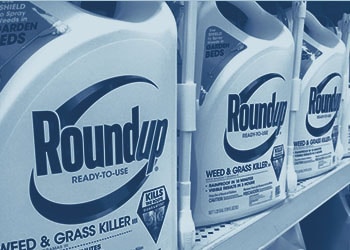What is Roundup (Glyphosate)?
Roundup (whose main ingredient is glyphosate) is a broad-spectrum herbicide used to kill weeds that compete with other crops. Popularly used as a lawn and garden weed killer, it was introduced commercially in 1974 by Monsanto Co. to be used is in the agricultural industry. Today, nearly all the cotton, soy, and corn grown in the United States are treated with this substance.
Roundup’s main ingredient, glyphosate, works by interfering with a plant’s ability to form amino acids necessary for protein synthesis and plant growth. Plants that have been treated typically die within two to three days after the chemical has been absorbed by their leaves and shoots.
Since 1996, farmers have been able to use “Roundup Ready” crops that resist its toxicity, resulting in a reduction of crop damage and easier weed management. These special seeds have been genetically engineered to tolerate the chemical. Thanks to these OGMs, farmers could apply the weed killer to entire fields without worrying about destroying crops. Between 1987 and 2012, annual U.S. farm use of glyphosate increased from less than 11 million pounds to nearly 300 million pounds.

Roundup Herbicide Risks and Side Effects
For nearly 20 years, scientists have been documenting the health consequences of Roundup and glyphosate in our food, in our water, and in the air we breathe. Researchers suggest that people who are sick have higher levels of this toxic substance in their bodies than healthy people. They also found that exposure contributes to the following side effects:
- Alzheimer’s disease
- ADHD
- Autism
- Anencephaly (birth defect)
- Brain cancer
- Breast cancer
- Depression
- Kidney disease
- Diabetes
- Heart disease
- Parkinson’s disease
- Multiple Sclerosis
- Other side effects
Based on epidemiological studies, animal studies, and in vitro studies, the World Health Organization’s International Agency for Research on Cancer (IARC) classified glyphosate as “probably carcinogenic in humans” in 2015.
Some reports, particularly one issued by the European Food Safety Authority (EFSA), have concluded that the weed killer was “unlikely to pose a carcinogenic hazard to humans.” Differences in evidence may be due to types of studies looked at by the EFSA that examined the effects of glyphosate alone, as opposed to other reports and studies that specifically examined the effects of this substance as it is used in Roundup.
Roundup Cancer Risks
A Roundup lawsuit alleges that a farm worker was diagnosed with non-Hodgkin’s lymphoma after years of being exposed to the herbicide. According to the American Cancer Society, non-Hodgkin’s lymphoma is a type of cancer that begins in cells known as lymphocytes, which are a part of the body’s immune system and are located in the lymph nodes and other lymphoid tissues. There are a wide number of different lymphomas, and they can affect any person of any age. Common signs and symptoms include:
- Enlarged lymph nodes
- Swollen abdomen
- Feeling of fullness after only a small amount of food
- Chest pain or pressure
- Shortness of breath or cough
- Fever
- Weight loss
- Night sweats
- Fatigue
- Low red blood cell counts (anemia)
According to the American Cancer Society, over 70,000 people will be diagnosed with this condition in 2016, and about 20,000 of those diagnoses with it will die. While some types of non-Hodgkin’s are common among childhood cancers, more than 95 percent of cases occur in adults.
For over 40 years, farmers worldwide have used Roundup to kill weeds that compete with their crops. The people who are most at risk of the above described dangerous effects include farm workers and landscapers as well. Additionally, those who work in nurseries and garden centers may be also at risk.
Lauren A. on May 16, 2016
Attorney Group reviewed by:"These guys are a pleasure to work with -- very strategic and very responsive, which makes for a great business partner! I can tell that they are passionate about making sure all clients get the attention and expertise they deserve."Rating: 5 ★★★★★
Why you should file a Roundup lawsuit?
A Roundup lawsuit may be an option for people who have developed certain forms of cancer after being exposed to the product. Many farmers, homeowners, gardeners and landscapers used this herbicide to eliminate weeds that compete with other crops. However, its primary ingredient, glyphosate, has been declared a probable human carcinogen by the World Health Organization. Affected individuals and their families may be able to pursue a claim and recover compensation with the help of a product liability attorney.
To ask any information, or evaluate if you’re eligible for a monetary reward, contact Attorney Group today. Discussing your legal options is free, confidential and without any obligation on your part. The lawyers we will connect you to will answer your questions, and if you choose them to act on your behalf, they will assist you throughout the legal process.
Has There Been a Roundup Recall?
Although a Monsanto Roundup recall has not been issued, several litigations claim that the product manufacturers failed to disclose known risks associated with the herbicide and that people suffered damages as a result. Failure to warn of possible risks associated with a product can be a basis of product liability, regardless of whether the product has been recalled.
As scientific findings concerning the carcinogenic risks associated with this substance continue to be inconsistent, the European Union has decided not to extend the license for glyphosate use. Consumer groups in Europe continue to pressure governments, potentially paving the way for a future recall even in the United States.
(888) 888-0612
Roundup Class Action and Settlement
A Roundup class action has recently reached its end as Monsanto announced its will to reach a settlement. Many consumers who filed a claim, alleged that they would never have purchased Roundup products if they had been properly informed that glyphosate targets an enzyme that exists in the human body with dangerous consequences.
The settlement resolves the class action lawsuit pending in the United States District Court for the Eastern District of Missouri, although Monsanto admits no liability. The company agreed to pay $21.5 million to resolve the litigation, providing each plaintiff with roughly half of the average retail price of the product.
Roundup Lawsuit Claims
To prevent plaintiffs from receiving just a few dollars as compensation, many individual litigations have been filed across the country. The lawsuits are alleging that Monsanto knew that the main ingredient in Roundup, glyphosate, was hazardous to human health. One lawsuit alleges that Monsanto:
[L]ed a prolonged campaign of misinformation to convince government agencies, farmers and the general population that Roundup was safe.
Monsanto, in fact, has proclaimed and continues to proclaim that glyphosate-based herbicides, including Roundup, create no unreasonable risks to human health or the environment.
The plaintiff alleged that he regularly used Roundup for over 40 years from 1975 to 2016, with no previous knowledge that use of the herbicide could have led to the development of cancer. In 2004, the victim was diagnosed with non-Hodgkin’s lymphoma.
With American’s increasing exposure to these dangerous substances, affected families should consider the advice of an experienced attorney to learn more about their legal rights.
Have You Seen a Roundup Lawsuit Commercial?
If you saw Roundup lawsuit commercial on television, you might be in need of further information before filing a litigation.
The purpose of this article is to help you decide whether you or a loved one who has been affected by the negative effects of this weed killer might be eligible to pursue a claim against the manufacturer.

Roundup Lawsuit News
- 2016Lawsuits allege that exposure to Roundup may be linked to certain forms of cancer, including non-Hodgkin’s lymphoma, and that Monsanto failed to provide adequate warnings about the alleged risks of cancer associated with the herbicide.
- 2015The IARC publishes a reported stating that glyphosate is “probably carcinogenic in humans.”
- 2009French court affirms earlier judgment that Monsanto had falsely advertised its herbicide product as “biodegradable” and that it “left the soil clean.”
- 1996New York Attorney General files lawsuit against Monsanto based on its false and misleading advertising of Roundup products, leading the company “to cease and desist from publishing or broadcasting any advertisements [in New York] that represent” the toxicity of the product and its impact on the environment.
- 1996Monsanto develops “Roundup Ready” seeds.
- 1974Roundup brought to market by Monsanto, a multinational agricultural company based in the United States.
How a Roundup Lawsuit Can Help
Makers of herbicides have a duty to sell products that are free from defects and that are not unreasonably dangerous. If a product poses a risk of serious injury, the manufacturer must provide adequate warnings of the danger.
Failure to do this can make the manufacturer legally responsible for injuries caused by the product, and people harmed may be entitled to compensation, including:
 Medical Expenses
Medical Expenses
 Lost Wages
Lost Wages
 Pain and Suffering
Pain and Suffering
The families of those killed may be eligible to recover money for funeral expenses and the pain that comes with losing a loved one.
People who have sustained injuries caused by this weed killer are encouraged to seek legal counsel from a qualified product liability lawyer.





